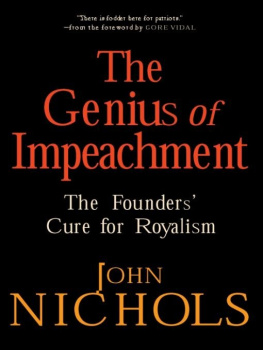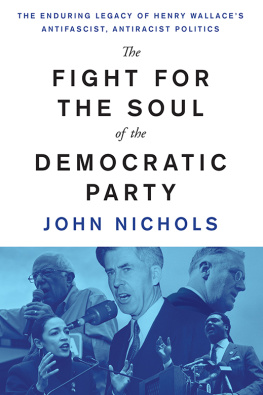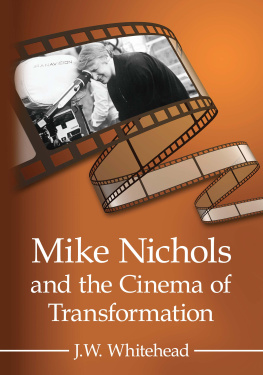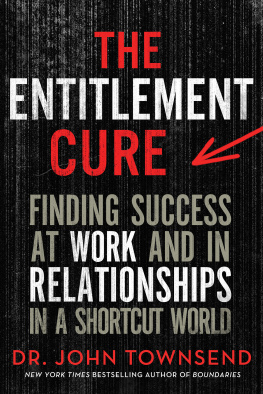FOREWORD
GORE VIDAL
Of course, George Bush and Dick Cheney have committed acts that would merit impeachment. In a proper country, they would be tried as traitors. Your dont lie to a country, get it into a war, waste a trillion dollars, kill a lot of people all because of your vanity and lust for oil and admiration for your corporate partners. If that isnt treason, I dont know what is.
It is a crisis, but, after all, crises are supposed to be met bravely and surmounted by whatever means a democratic society would like to employ.
I suppose it might be simpler to add a Constitutional amendment creating the right of recall, so that the people, when they realize that the administration is insane, or totally corrupt, or is going to destroy the country through attacks on enemies that are no threat, may act to address the crisis.We know that, when they are aware of their authority, the people are more than willing to exercise it. I was in California when poor Gray Davis was being thrown out. Davis was a perfectly standard, ordinary, not-particularly-corrupt governor, but they got him out and they got the Terminator in. There was excitement, real excitement, at the thought that citizens could do something about an executive who had lost their approvalthat they were, temporarily, in charge. If there was a right of recall at the federal level, I have no doubt that the movement to remove the president, the vice president and other members of the administration would be advancing with great strength and speed at this point.
We do not have recall at the federal level. But we do have impeachment.
Whats in the Constitution is in the Constitution. We do not need the House or the Senate to vote on what the Constitution says. The Constitution says that a president, or a vice-president, for that matter, shall be impeached for high crimes and misdemeanors. Well, we have seen the high crimes and misdemeanors. They are in evidence.
Impeachment is available to us as an option for addressing the crisis of George Bushs presidency. It can be done. The discussion is in the air, as it should be.
The moment has now grown dangerous, what with the president elevating himself to godhood, to a place so far above the law that he no longer can be bothered to acknowledge it. The very sight of the president signing, as his Constitutional duty, legislation out of Congress telling him thou shalt not torture, and then saying that he does not feel bound by that legislation ought to seal the caseof course, the president is bound by this legislation, and if he is, acts as if he is not bound by it, you can impeach him. Thats the original intent.
This president is so plainly guilty of so many things that he would be impeached by even a moderately impartial House, then tried and found guilty by a similarly impartial Senate. I dont see any problems or confusions there, except partisanship and a media which is vicious and which has already chosen sides and will smear anybody who tries to see that justice is done.
Americans have been hypnotized by the mantras that our would-be fascists keep chanting. Inherent powers of the commander-in-chief in wartime? Well, there is no war. No war has been declared. This is not wartime. The president does not have inherent powers of any sort; he has enumerated powers. The Constitution tells you exactly what they are, including the responsibilities of the commander-in-chief: to repel invasions and so forth. George Bush has so clearly exceeded his authority.
The people, I think, understand this. But, because our media has not informed them, and because our education system has not educated them, the people do not know what to do. I would advise them to read the Constitution. Read this history of impeachment. There is fodder here for patriots.
Henry B. Gonzlez
We did not pledge an oath of allegiance to the president but to the Constitution.
INTRODUCTION
HOMAGE TO HENRY B. GONZLEZ: AN INTRODUCTORY NOTE ON THE NECESSITY OF GETTING COMFORTABLE WITH IMPEACHMENT
I appeal to the future for my vindication.
Henry B. Gonzlez
For the last quarter of the American century, the lonely task of maintaining the essential infrastructure of the American experimentthe system of checks and balances that George Washington identified as the nations primary protection against the love of power, and proneness to abuse it that was certain to be entertained by the executives who succeeded himfell to the son of Mexican-American immigrants who had been born Enrique Barbosa Gonzlez in the barrio of San Antonio.
Henry B. Gonzlez, as he was known during the thirty-seven years he served in the U.S. House of Representatives, learned his Constitution well at St. Marys University School of Law in his familys adopted city. He adhered to the documents demands with a passion rarely mustered by members of Congress who could trace their bloodlines back to a revolution fought against the royal prerogative. Perhaps it was Gonzlezs experience of battling the Texas segregationists of the 1950sas a state senator who led the longest filibuster in the history of the Texas legislature to block bills written to circumvent the U.S. Supreme Courts Brown v. Board of Education decisionthat inspired him to stand, often alone, in defense of the rule of law. Perhaps it was the experience of challenging the most powerful Anglo Democrats in Texas as the first serious Hispanic candidate for the governorship of that state, in 1958, that gave him the courage to raise a sometimes solo voice against presidents engaged in the elected despotism against which Jefferson had warned the protectors of the republic to maintain their guard.
In terms of teaching Anglos that Mexican-Americans and other minorities are entitled to equality, the Lone Star State political seer Maury Maverick observed of Gonzlez, he was in Texas 50 percent Tom Paine, 50 percent Thomas Jefferson.
In Washington, Gonzlez was 100 percent of what the founders intended a member of Congress to be.
Whatever the impetus for his intense adherence to the rules of the Republic, Henry B. took the long view of his membership in Congress. He was not merely there to represent the constituents back home in Bexar County, although his championship of their interests was legendary. And he was certainly not there to practice blind partisanship or ideological loyalty, although he was remembered by those who knew him as one of the truest and greatest progressives of the twentieth century. He was in Congress, Gonzlez believed, to uphold an oath of office that committed him to support and defend the Constitution of the United States against all enemies, foreign or domestic. And so he did, even when those enemies resided in the White House.
The congressman from Texas was sometimes jokingly referred to by colleagues as Henry B. Gonzlez, D-Impeachment. Gonzlez proposed and supported more impeachments against more presidents than any member of the House in the history of the land.












